Protesters in Iran’s southeast attacked trucks belonging to Afghan drivers during a demonstration on Friday over water rights for a river that flows from Afghanistan, Iranian state media said.
Demonstrators from Sistan-Baluchestan province, which shares a frontier with Afghanistan, rallied at a border crossing to protest the issue concerning the Helmand River, state news agency IRNA reported.
The Helmand flows from the Afghan province of the same name into Lake Hamoun, which straddles the Afghanistan-Iran border.
Defying a ban on gatherings at the crossing announced on Thursday, demonstrators held placards and called for negotiations over water rights, IRNA said.
Iranian security forces intervened when protesters attacked several trucks belonging to Afghan nationals stationed at the crossing, the report said.
A rally was also held in front of the Afghan consulate in Sistan-Baluchestan’s capital Zahedan, IRNA added.
Last year, then Afghan president Ashraf Ghani inaugurated the Kamal Khan Dam on the Helmand River, announcing that Afghanistan would no longer supply “extra” water to Iran for free but instead exchange it for oil.
Tehran’s foreign ministry said Iran’s share was legally defined in a 1972 agreement between the two countries and demanded Afghanistan uphold the deal.
The Helmand River originates in central Afghanistan and reaches the Iranian border in the Sistan region after a journey of more than 1,000 kilometers (600 miles).
Lake Hamoun used to be one of the largest wetlands in the world, straddling 4,000 square kilometers (1,600 square miles) between Iran and Afghanistan, with water rolling in from the Helmand.
But the wetland has since dried up due to drought and the impact of Afghan dams and water controls.

